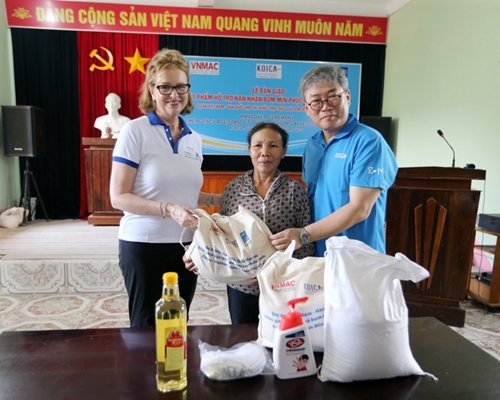Cho Han Deog, Country Director of the Korea International Cooperation Agency (KOICA) in Vietnam, said that many people have been seriously affected by the disease.
    |
 |
|
At the event to present food, face masks, and hand sanitizers to UXO survivors and their families (Photo: baodansinh.vn) |
The gifts are the Korean people’s sentiments to the Vietnamese people, he stressed.
With the support of the Australian Department of Foreign Affairs and Trade (DFAT), the Embassy of Ireland in Vietnam and the KOICA, the UN Development Program (UNDP) in Vietnam organised the rapid assessment to help identify health and socio-economic challenges faced by People with Disabilities (PwDs) and their families during COVID-19.
Many of the UXO survivors in Quang Binh and Binh Dinh provinces participated in this assessment and shared their difficulties in accessing necessary medical care, supplies, and basic items such as food and personal protective equipment. Specifically, 66 percent of UXO victims do not have enough money to purchase essentials, 59 percent see their family income reduce and 35 percent are facing temporary unemployment.
“We wanted to react quickly to meet some of these urgent needs and today’s event is our immediate response to the survey results presented ten days ago,” said Caitlin Wiesen, UNDP Resident Representative in Vietnam.
Assistance to UXO victims and their families is an important component of the RoK-Vietnam Mine Action Project, which was jointly launched in early 2018 by Vietnam National Mine Action Centre, KOICA, and UNDP to accelerate mine action for safety and sustainable development. In collaboration with the Ministry of Labor, Invalid and Social Affairs, the project has developed an official database on 75,000 people with disabilities, 9,100 of them are UXO survivors. The database includes need assessment of UXO survivors, thus enabling the project to provide them relevant and targeted support.
The project also helps strengthen the governance and management of national mine action activities and reduce future accidents through increasing the awareness in local communities about the potential risk from ERW. The project has so far surveyed nearly 17,000 hectares of land and cleared over 4,000 hectares of contaminated areas in Quang Binh and Binh Dinh, providing more land for development projects in these provinces.
Source: VNA